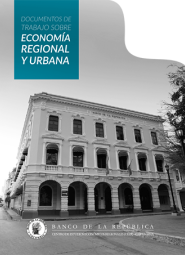Tax Benefits and Regional Development: Evidence from Colombia
The working paper series Documentos de Trabajo sobre Economía Regional y Urbana is published by Banco de la República (Central Bank of Colombia). The findings and opinions are those of the authors and do not reflect the views of Banco de la República or its Board of Directors.
The opinions expressed in this document are those of the authors and do not necessarily reflect the views of Banco de la República or its Board of Directors..
ABSTRACT
This document aims to evaluate the impact of tax incentives granted to companies on regional development by studying the Páez Law in Colombia. This law was promulgated to attract firms to the region affected by the earthquake and the avalanche of the Páez River in 1994. This is a particularly interesting natural experiment since the law arose from an unexpected shock and numerous municipalities that were not directly affected by the disaster were covered by its benefits. This allows us to differentiate the effect of tax exemptions from other factors related to the tragedy, such as property damage and aid to the victims. The causal effects are identified by comparing the municipalities that are beneficiaries of the law, affected and not affected, with a group of synthetic controls built on the trajectory balancing methodology. The results indicate that exemption policies had no major effects, either on local public finances or on the quality of life. In a complementary exercise, the effect of the Quimbaya Act of 1999 is evaluated, finding similar results. This Law benefited the municipalities affected by the Coffee Belt earthquake.




















































